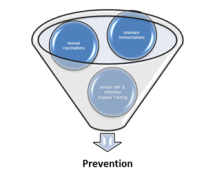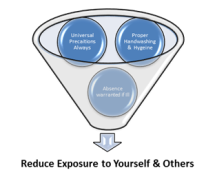
The purpose of this policy is to educate and stress the importance of preventing or minimizing the spread of communicable diseases. The clinical field experience student has the inherited risk of contracting or spreading a variety of different microorganisms that are capable of passing from one individual to another. Through maintaining proper immunizations, annual vaccinations and the practice of universal precautions, the spread of communicable disease in the athletic training setting may be controlled with an understanding that it is difficult to prevent exposure from all communicable diseases. Students enrolled in Central Connecticut State University Athletic Training Education Program (ATEP) must have on record proof of protection against communicable diseases before being permitted to engage in clinical field experiences as noted in ATEP medical requirements section. Annually, students will acknowledge education and willingness to practice according to the Communicable Disease Policy.
The Center for Disease Control outlines specific policies for minimizing exposure of communicable diseases within health care facilities, health care providers and patients.
Communicable Disease: An infectious disease transmissible (as from person to person) by direct contact with an affected individual or the individual’s discharges by indirect means. Microorganisms are typically passed through direct contact with an infected individual or direct contact with the bodily fluids of an infected individual.
Prevention of Exposure and Infection
In an effort to minimize exposure to the athletic training students involved with patient care during their clinical field experiences the following guidelines have been established.
1. Verification of vaccination: Hepatitis B, mumps, rubella, varicella, tetanus/diphtheria, and tuberculosis.
2. Students must complete annual blood borne pathogen and infectious agents training.
3. Students are required to use “Universal Precautions” at all times.
4. Students are required to use proper hand washing and hygiene techniques at all times.
5. Students with signs and symptoms of a communicable disease must not provide patient care.


Common Sense & Shared Responsibility
Students need to understand the importance of self-care, as well as seeking appropriate medical care if they acquire an illness that may jeopardize the health and safety of others: i.e. patients, students, faculty & staff members. Students who contract a serious or communicable disease or develop signs/symptoms of an infectious illness (fever, vomiting and/or diarrhea) should consider themselves to be contagious and should remove themselves from their academic and clinical field experiences.
Health Policy For Contagious Illness And Contact With Patients
- Make an appointment with University Health Service or with your personal health care provider for evaluation, diagnosis, care; and discuss with the health care provider the restrictions and or precautions that should be imposed due to the diagnosis.
- Once a student is referred to a health care provider for medical care, then the provider will determine the ability of the athletic training student to attend academic classes and clinical field experience. Do not return to classes or clinical field experience until cleared by your health care provider.
- Do not return to classes or clinical field experience fieldwork until at least 24 hours after being afebrile (fever free) without the use of fever reducing medications.
- A health care provider, who must determine the student’s ability to return to the clinical field experience setting, should evaluate chronic medical condition that may result in the athletic training student contracting or spreading a microorganism.
- The student should contact their preceptor following any evaluation with a health care provider that places restrictions or absence from classes and or their clinical field experience so that appropriate remediation can be discussed and implemented.
- Academic Affairs office should be informed in the event of a prolonged illness from a communicable disease, students should refer to Central's Absence Policy for specific criteria.
- Should an athletic training student be notified that they were possibly exposed to an infectious illness during an off-campus clinical field experience, the policies and medical processes of the affiliated site will be incorporated.
Documentation of Absence
A note from a health care provider must be obtained if the student is medically advised in regards to the ability to continue with classes and clinical field experience, or if any restrictions are required. As long as the student is deemed to be contagious by the health care provider then that student will not be allowed to attend classes or clinical field experiences.



